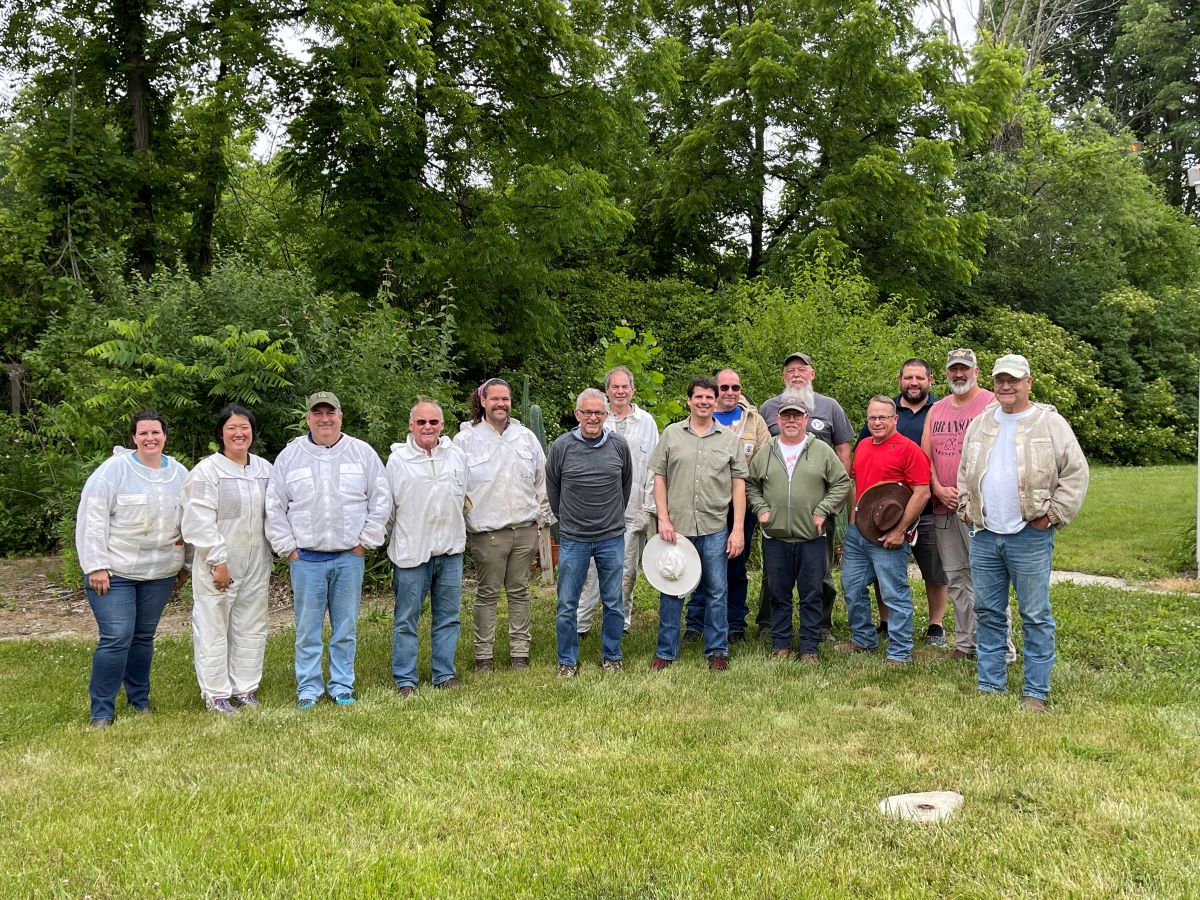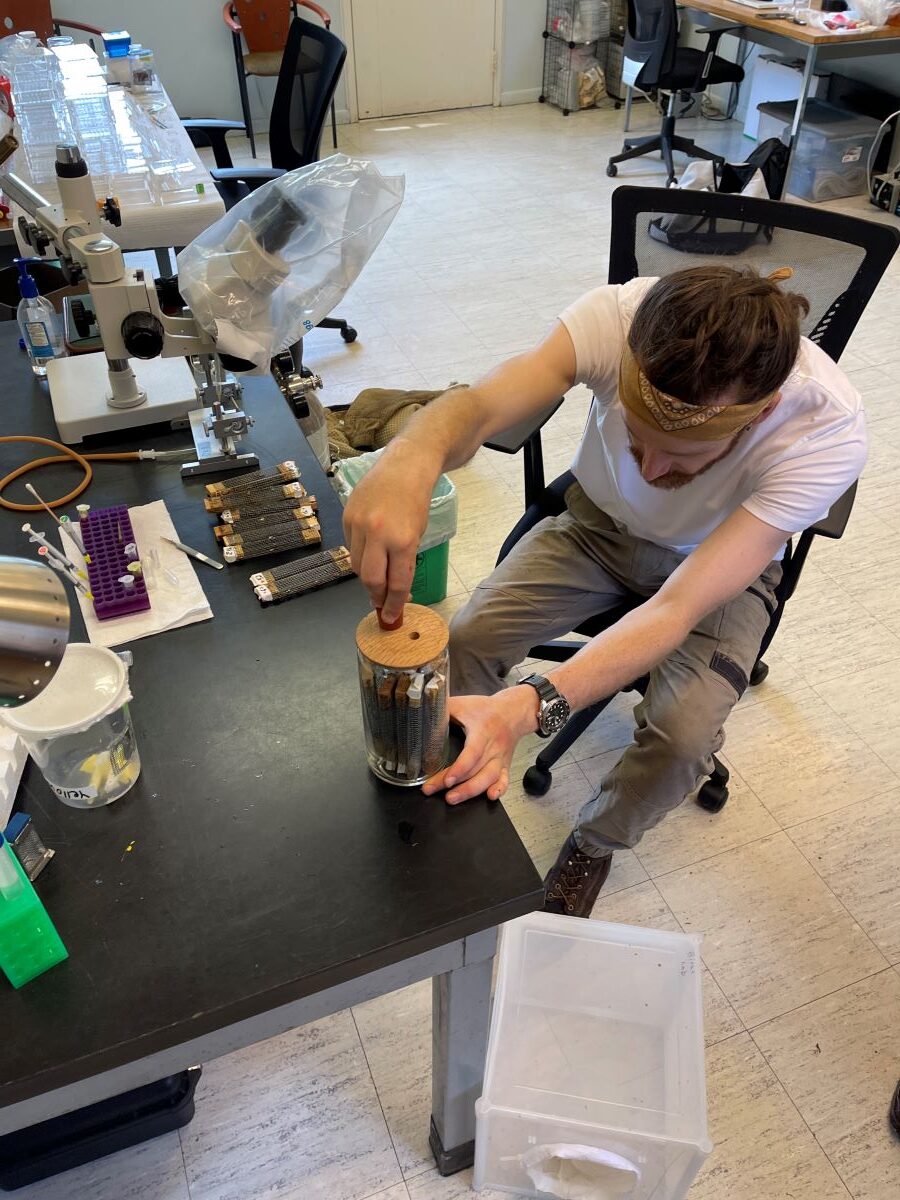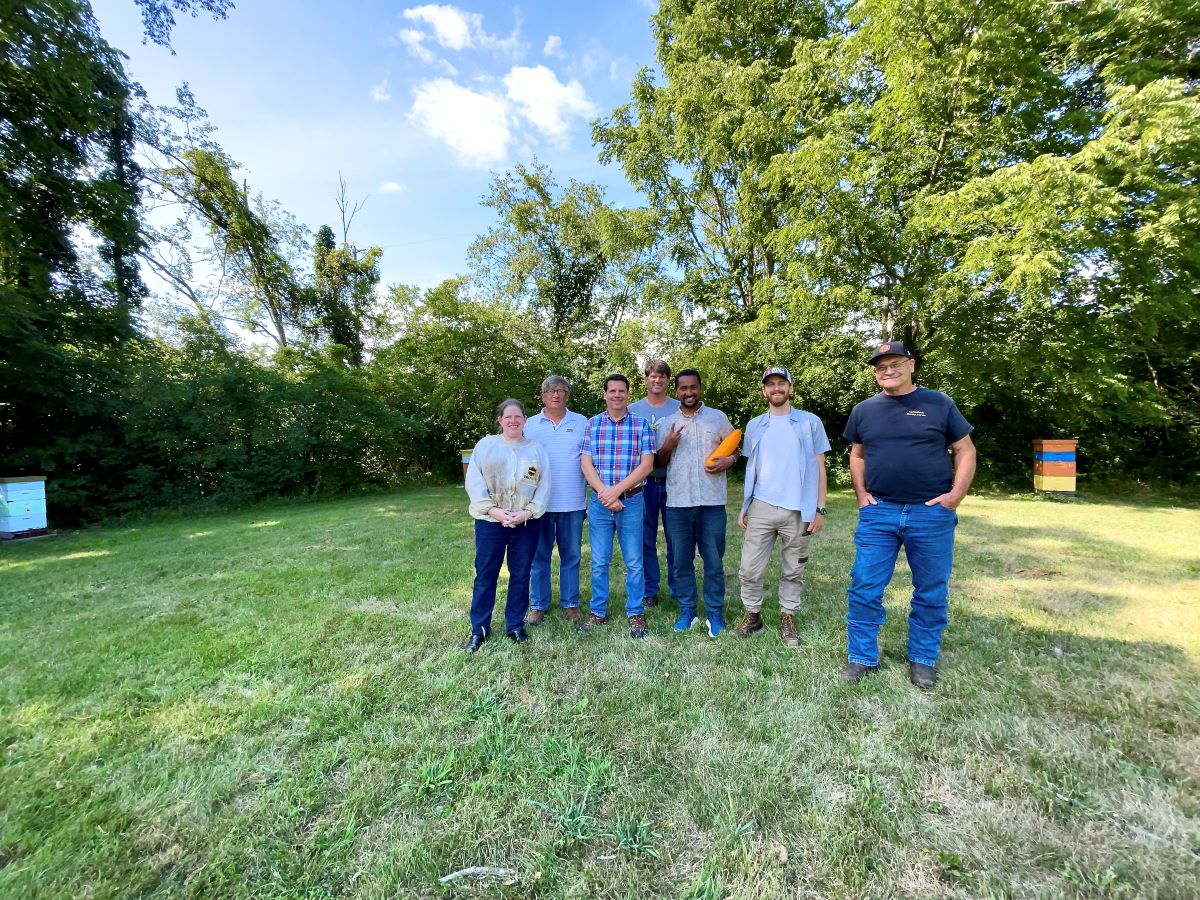Short Courses
Short Courses
We offer two annual short courses and several extension presentations on beekeeping, bee breeding, and native bee biology and identification. Our short courses occur at Purdue University. Our extension programs can be held anywhere, so please contact us for more information.Mastering the Art and Science of Queen Rearing
Krispn Given
June 11-12, 2026
These classes are limited to only 25 students and typically fill up quickly!
Where: Purdue Bee Lab (find on Maps)
This course is designed for those who want to learn the art and science of queen rearing using the larval transfer technique (grafting). This is a 2-day course. It ends on the first day of The Beekeepers of Indiana summer field day.
Those attending the course will get a video and queen rearing manual demonstrating queen rearing techniques. Please bring your own veil and protective suit.
The cost of the two-day course is $200. The class is limited to 25 students. To register for our annual course please contact us.
In the course, you will learn about:
- Introduction to Queen Rearing Systems
- Biology of Queens & Drones
- Advanced beekeeping techniques
- Selecting Winter-Hardy Mite-resistant bees
- Commercial Queen Production
- Preparing finishing colony (queenright vs queenless)
- Preparing Swarm Box
- Double Screen system
- Grafting (hands-on)
- Alternative methods
- Procedure from Egg to Queen
- Queen Mating
- Practicing what you have learned
- Marking Queens
Agenda
Thursday
- 8:00 a.m. – Registration
- 9:00 a.m. – Class: Lecture on reproductive biology & queen rearing techniques
- 10:00 a.m. – Panel discussion on queen rearing with students
- 12:00 p.m. – Lunch (provided)
- 1:00 p.m. – Colony manipulations, set up starter finisher colony
- 2:00 p.m. – Prepare the swarm box (closed flight system)
- 4:00 p.m. – Adjourn
Friday
- 8:30 a.m. – Hive manipulations and practice grafting (In the classroom)
- 12:00 p.m. – Lunch (provided)
- 1:15 p.m. – Placing grafted cups in finishing colony and swarm box
- 4:00 p.m. – Adjourn
Saturday
Students are welcome to return Saturday and see if their grafted cells were accepted!
9:00 a.m. – Check grafted cells for acceptance and remove from warm box and place in finishing colony
10:30 a.m. – Enjoy the ISBA summer meeting after you check your queen cells
4:00 p.m. – Adjourn
Prerequisite: At least one year of beekeeping experience
Instructors:
- Krispn Given, Apiculture Specialist, Department of Entomology, Purdue University
- Dale McMahan, IN Master Beekeeper, Apis Engineering
- David Shenefield, IN Commercial Beekeeper and bee breeder, Clover Blossom Honey

Krispn Given with the 2024 Queen Rearing class
Advanced Techniques in Instrumental Insemination
Krispn Given
September 3-4, 2026
Where: Purdue Bee Lab (find on Maps)
Sponsored by the Indiana Queen Breeders Association (IQBA)
 The class is designed for beekeepers and researchers who want to create and maintain a successful honey bee breeding program through the use of controlled mating with the use of instrumental insemination. The course will begin with a presentation on honey bee mating biology and advanced techniques of instrumental insemination will be discussed and demonstrated on a 4k screen. Students will then get detailed instructions while practicing semen collection and insemination of virgin queens supplied to them. Participants will be able to take their successfully inseminated queens home. The cost of the two-day interactive course is $1000 with a $200 deposit required to secure the course please contact Krispn Given contact us. We keep our class sizes small so (3 students) we can focus on each student’s individual needs, so please contact us early as these classes fill up quickly.
The class is designed for beekeepers and researchers who want to create and maintain a successful honey bee breeding program through the use of controlled mating with the use of instrumental insemination. The course will begin with a presentation on honey bee mating biology and advanced techniques of instrumental insemination will be discussed and demonstrated on a 4k screen. Students will then get detailed instructions while practicing semen collection and insemination of virgin queens supplied to them. Participants will be able to take their successfully inseminated queens home. The cost of the two-day interactive course is $1000 with a $200 deposit required to secure the course please contact Krispn Given contact us. We keep our class sizes small so (3 students) we can focus on each student’s individual needs, so please contact us early as these classes fill up quickly.
The two-day course is held at the Purdue Honey Bee Laboratory. It is principally taught by Krispn Given, who is recognized as one of the leading international authorities in instrumental insemination and honey bee breeding. He leads the honey bee breeding program, research, and extension activities at Purdue University’s honey bee laboratory. Krispn has been engaged in honey bee breeding for the last 18 years at Purdue. He was instrumental in developing the Mite-biter strain (in collaboration with honey bee geneticists Greg Hunt). Today he continues to breed for increased resistance to the Varroa mite by selecting upon hierarchal behavioral traits grooming and mite-biting.
Students are encouraged to bring their own instruments: We offer a $150 instrument rental and a $50 microscope rental if you have not acquired an instrument of your own.
If you have questions, please contact us.
Agenda
Thursday
- 8:00 a.m. - Registration/coffee and snacks
- 9:00 a.m. - Class begins with a ppt talk on instrument setup and Co2 safety, Krispn Given
- 10:00 – 12:00 p.m. - Krispn demonstrates how to set up the instrument’s hydraulics system, students start to set up their instruments with assistance from Dale and Krispn
- Noon - Lunch
- 1:00 p.m. - Troubleshoot any problems with setting up your instruments, Dale McMahan Krispn Given work with individual students
- Demonstration of the semen collection technique
- Partial and full eversion of the drone endophallus
- Special emphasis on avoiding contamination of sperm (developing sterile technique)
- 1:30 – 4:00 p.m. - Students practice everting drones and semen collection; Dale and Krispn will assist with any questions about the process
- 4:00 p.m. - Open discussion about bee breeding and semen collection: Krispn, Dale
- 5:00 p.m. - Adjourn
Friday
- 8:00 a.m. - Coffee and snacks
- 9:00 a.m. - Talk on Queen and Drone Reproductive Biology with Krispn Given
- 10:00 a.m. - Continue to practice collecting semen from drones
- 11:00 a.m. - Instrumental insemination demo by Krispn Given
- Noon - Lunch
- 1:00 – 4:00 p.m. - Continue student practice inseminating virgin queens. Each student will also have an opportunity to practice II with a microscope fitted with a camera to help identify technical problems on a 4K monitor
- 4:00 pm - Final panel discussion on what was learned: Dale McMahan, Krispn Given
- 5:00 pm - Adjourn
Assistance from: Dale McMahan, IN, Master Beekeeper
Prerequisites: Successful queen and drone rearing along with advanced beekeeping skills. Your own insemination equipment is strongly encouraged. Please contact us to register. We can also be reached directly by calling the bee lab at (765) 496-1299
*Please bring a veil and comfortable clothing.

